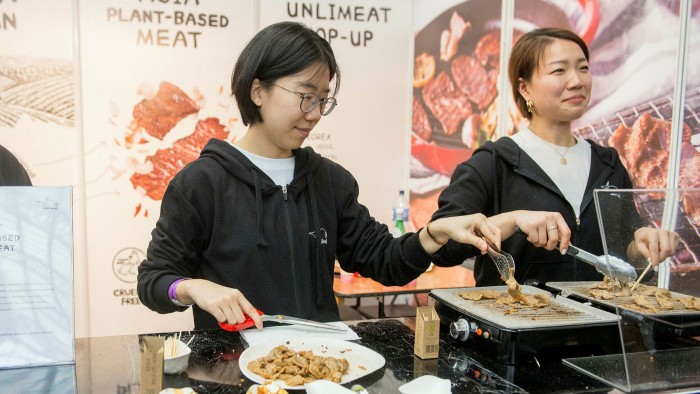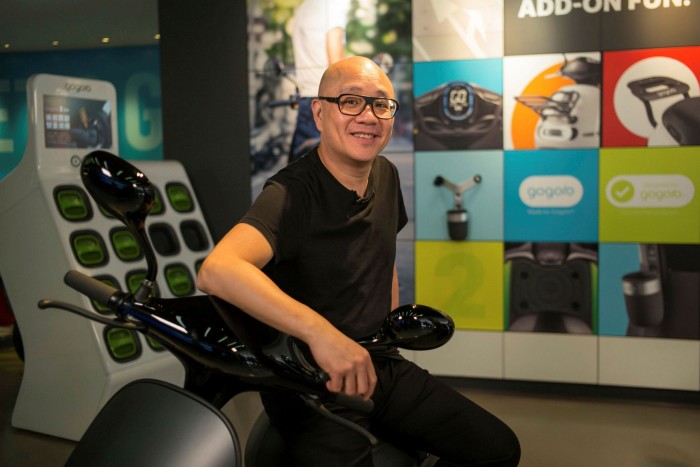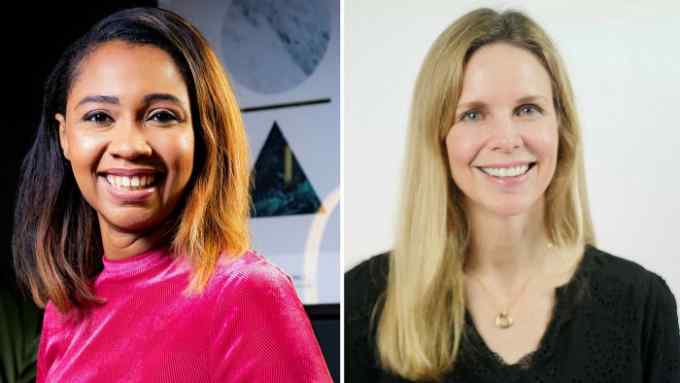Asian ESG wave gathers pace as consumers and start-ups buy in

Simply sign up to the ESG investing myFT Digest -- delivered directly to your inbox.
Mouthfuls of succulent Korean barbecued beef doused in deep red ssamjang hot sauce — a dish served everywhere from Michelin-starred restaurants to street-side stalls — does not usually invoke thoughts of sustainability. Zikooin wants to change that.
The Seoul-based start-up has developed technology that turns grains, oats and nuts into Unlimeat, an alternative to the popular Korean-style beef. The company attracted $4m in its first round of fundraising, mostly from US venture capital, and is now expanding from Seoul into markets and restaurants in Hong Kong, Shanghai and the US.
Zikooin is part of a growing trend in Asia: the adoption of alternative ways of life to help counter the damage inflicted on the planet during decades of rapid economic development.
“For Europe and America, people started paying more attention to sustainability and the environment when they’re satisfied with their income,” says Seyeon Park, Zikooin’s sales manager. “Here [in Asia], it has just begun.”
Across an array of industries — including food production, energy, transport and financial markets — new companies and products are on the rise in Asia, underpinned by an ethos of environmental, social and corporate governance (ESG) thinking.
There is optimism that the ESG wave in Asia will gather more pace as the world’s unprecedented stimulus and record-low interest rates — which governments and central banks have deployed in response to the economic fallout from the coronavirus — funnel more cash into eco-friendly businesses.
Investment into cleaner energy in Asia is “going into overdrive”, says Edgare Kerkwijk, managing director of Asia Green Capital Partners, a Singapore-based developer of renewable energy projects in the region. He adds that Asia is far behind similar transitions away from fossil fuels under way in parts of Europe for decades.
While many of Asia’s biggest corporates — including tech manufacturers and banks — still face sharp criticism from environmental activists and international institutional investors alike for being too slow to ditch their dependence on fossil fuels, a new generation of consumers and entrepreneurs are forcing change.
“It’s not only the governments that are saying, ‘OK, maybe we need to do this’. Public opinion has moved and companies are now very cautious of being associated with anything that's not sustainable or green,” Mr Kerkwijk says. “A lot of young people are setting up sustainability start-ups . . . It is because we have so much more to do — everyone sees this as a commercial opportunity.”
One of the barriers to growth of ESG in Asia stems from investors and governments struggling to adapt to longer-term horizons for policy direction and funding, both of which are required to create entirely new industries and supply chains.
Horace Luke, founder of Taiwan e-scooter maker Gogoro, was among those to see the potential of the green transition years ago.

Mr Luke, who played a key role in developing Microsoft’s Xbox and HTC’s smartphones before founding Gogoro in 2011, says many traditional investors in Asia have stayed focused on short-term returns, rather than shift to the “patient capital” needed to fund new infrastructure, such as that associated with the “inevitable” switch to electric vehicles.
“That is hard, because it takes a lot of investment, a lot of discipline, a lot of convincing investors: ‘Be patient, be patient, the world is changing’, he says. “Some believe me, some don’t.”
Gogoro has sold more than 340,000 vehicles, has thousands of battery swapping stations across Taiwan and has expanded into France, Germany, Japan and South Korea, as well as attracting investment from local and offshore funds.
Greenwashing — corporates and governments marketing themselves as environmentally friendly rather than taking real action — also remains a problem. But tech-savvy entrepreneurs are finding new ways to improve transparency and hold corporates to account. This is an important development in places such as South Korea, where challenging the reputation of the sprawling chaebol — the family-owned companies that have long dominated the country’s economy — risks serious consequences.
Thomas Yoon, founder of Seoul ESG consultancy Who’s Good, says that when he came into the industry in the early 2010s Korean companies were simply fabricating ESG data — a major risk to investors.
His company now uses artificial intelligence and automation to independently identify ESG risk across hundreds of South Korean businesses. Who’s Good’s latest annual report identified ESG problems at 164 of the companies listed on the Kospi 200 index, a majority of which related to governance issues.
“Ultimately, the development of data analytics technology will solve the problems of existing ESG assessments, identify sustainable enterprises that have been overlooked in the past, and solve the challenge of correlating ESG with financial performance,” says Mr Yoon.
The message from entrepreneurs involved in ESG in Asia is resoundingly positive, however, particularly after Xi Jinping, China’s president, pledged at the UN that China would be carbon neutral by 2060. Similar promises by the leaders of Japan and South Korea followed.
“[US president Donald] Trump was blaming everybody else,” says Mr Kerkwijk. “The Chinese made probably one of the most significant statements ever.”

Comments